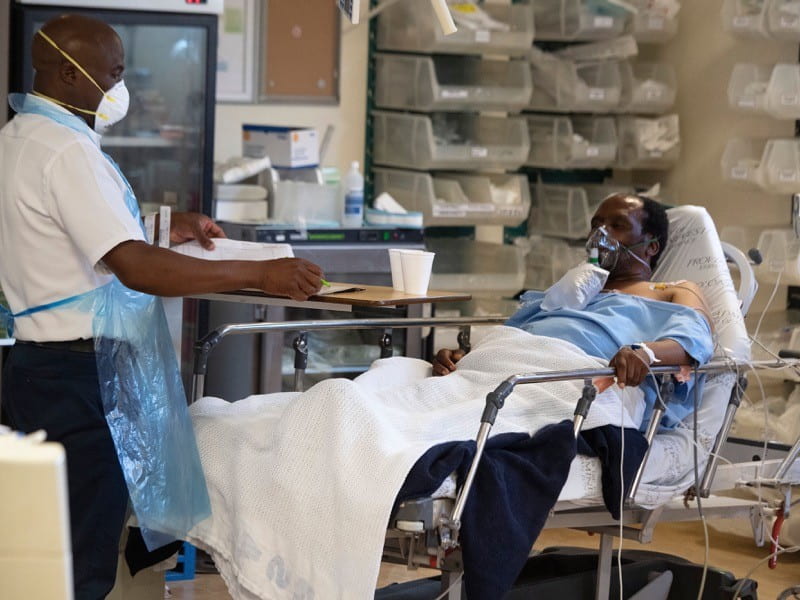A hospital worker and COVID patient in South Africa, where a new variant of SARS-CoV-2 has been identified. Credit: Rodger Bosch/AFP/Getty
Researchers race to determine why variants identified in Britain and South Africa spread so quickly and whether they’ll compromise vaccines.
Ewen Callaway | Nature | January 7, 2021
As concern grows over faster-spreading variants of coronavirus, labs worldwide are racing to unpick the biology of these viruses. Scientists want to understand why SARS-CoV-2 variants identified in the United Kingdom and South Africa seem to be spreading so quickly, and whether they might diminish the potency of vaccines or overcome natural immunity and lead to spate of reinfections.
“Many of us are scrambling to make sense of the new variants, and the million-dollar question is what significance this will have for the effectiveness of vaccines that are currently being administered,” says Jeremy Luban, a virologist at the University of Massachusetts Medical School in Worcester.
The first lab results are trickling in and many more are expected in coming days, as researchers rush to probe the viral variants and their constituent mutations in cell and animal models of SARS-CoV-2, and test them against antibodies elicited by vaccines and natural infections. A preprint published on 8 January found that a mutation shared by both variants did not alter the activity of antibodies produced by people who received a vaccine developed by Pfizer and BioNtech. Data on other mutations and vaccines are expected soon.
“By next week we’ll have much more information,” says Vineet Menachery, a virologist at the University of Texas Medical Branch in Galveston, whose team is gearing up to study the variants.
Underlying biology
Researchers spotted both coronavirus variants in late November and early December 2020 through genome sequencing. A UK-wide COVID-19 genomics effort determined that a virus variant now known as B.1.1.7 had been behind surging case numbers in the southeast of England and London; the variant has now spread to the rest of the UK and has been detected in tens of countries worldwide (see ‘Viral sequences’).
And a team led by bioinformatician Tulio de Oliveira at the University of KwaZulu-Natal in Durban, South Africa, connected a fast-growing epidemic in the country’s Eastern Cape Province to a coronavirus variant they call 501Y.V2. The UK and South African variants emerged independently, but both carry a bevy of mutations — some of them similar — in the coronavirus spike protein, through which the virus identifies and infects host cells and which serves as the prime target of our immune response.
Editor’s Note: This limited US coronavirus variant data is now available as a UCSC Genome Browser track. Learn more here: http://bit.ly/GBcoronavirus5. The UCSC Browser “B.1.1.7 in USA” track highlights unique aspects of the B.1.1.7 lineage, alongside the first nine genome sequences taken of the B.1.1.7 mutation found in the United States.
